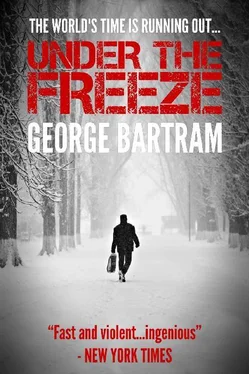“I want the man who calls himself Maxudov, and I want the plutonium.” He stood with his gloved hands by his sides. The room seemed encased in ice, dead with cold. “I will help you with information and I will not oppose you on any of those little grounds that would normally arise because you are a foreigner. But I remain above it all. Do not expect to communicate with me again. You will be given the means to communicate with appropriate authorities. All of that. Now, before I go: What more do you want from me?”
“I must talk to the others.”
“Of course. Telyegin first, you said. Good; I will arrange it, and the others. Their files? I will give the matter to an assistant; naturally, there will be censorship. You mentioned a ‘related matter.’ What is that?”
“Some German records from the Second World War.”
“I do not see how they relate. However, talk to my assistant about it. I will have the request examined; if it makes sense, you will have it. Now I must go.”
They shook hands again. “If you succeed, you can have a good life here. I would personally be grateful to you.” He seemed to say it as a formality.
“I have made other arrangements.”
Andropov’s eyes hooded over. “So be it. If you do not succeed…”
“Then no arrangements will be necessary.”
“Yes.” Andropov started for the door. The round-faced man darted out of his way, and the tall figure swept out, turning sharply to the left in the corridor and collecting lesser men around him as he passed.
The next morning early an unmarked truck came and took the old couple away. They had been given thirty minutes to pack up what they wanted.
“Where are we going?” the old woman asked. She was crying again.
“I don’t know, Mama,” the round-faced man said. “It can’t be worse than this, can it?”
He said it without rancor and certainly without any particular pleasure in their pain; yet Tarp winced at this reminder of the system with which he was working. He did not like the old man and woman; he was glad to see them go; but their own lives were so clearly irrelevant to a system that had other plans that he could not ignore the viciousness of it. Tarp did not believe in evil, just as he did not believe in good. He had neither faith nor readily definable politics anymore. He had given up trying to forgive human frailty in favor of overlooking it. But the offhand transplanting of the two old people was like seeing a huge, ugly eye open in what had been an empty sky, seeing it blink, and seeing it disappear again. The eye, like the log that is really an alligator, like the snake that appears under the foot, was obscene, and it made individual existence a pathetic lie.
The round-faced man brought in an exterminator, who sprayed white liquid over the floors where the old people had lived, while another man carried out armloads of their rags and trash, their pathetic belongings that they had guarded with chains and bars, and burned them. When darkness fell that night, the rooms smelled better and there was more space and the fleas were dead, and they might as well have ceased to exist. It was little consolation to Tarp to say that, being what he was, being the man he was with the past he had lived ( How many old couples did I move out of their homes in Viet Nam ?), he was implicated in the obscenity whether he actively helped the KGB root out its Maxudov or not. There was no consolation for being what he was — such was the executioner’s creed, the torturer’s creed, the agent’s creed. The only consolation in any of it was knowing that, unlike the old man and woman, he would never go without a struggle, and that was not a consolation of morals but of emotions as elemental as the ape’s grunt.
A woman came from Andropov’s staff and listened to his requests and went away; a day later the files began to come. She came with them. What Tarp was allowed to see was heavily censored, as if these were files that had already been combed for sensitive material, yet the woman looked over every page before he could read it. The materials that he had requested on the German civilians aboard the Prinz von Homburg “were in the process of research,” she said. He found Russian governmental jargon as difficult to follow as American.
* * *
Eugen Telyegin was a dying man. Andropov had been quite right about that. Telyegin was “of that generation,” as they said, meaning the ones who had fought in the October Revolution. He had been only fifteen then, but he had fought; he had lived through that first terrible winter close to Lenin, perhaps favored because of his youth by the ideological purists who liked his receptive mind. Tarp got this from the file, from photocopies of letters and newspaper stories from those days.
Telyegin received him in the downstairs room of a dacha outside the city. A car had come for Tarp in the evening and had taken him to a drab apartment in a block of drab apartments; next morning he was driven out to the dacha . Telyegin was in a wheelchair that had been placed between two electric heaters. An armchair had been placed for Tarp opposite him but too far from the electric coils to benefit from the heat.
Telyegin had inoperable cancer. That was in his file, too. It had begun in his lower bowel and it had spread. He had been given six months to live, but that had been two years before, and there were reports of his temporary remissions, as if the body were urged back to life by his commitment to his work. Now, nobody knew when he would die, but he was dying.
Yet his eyes were eager, like the eyes of a young man on the way up. When he could lift his voice above a tired whisper, he was passionate.
“I have not betrayed the Party,” he hissed at Tarp. “Not the Party, not the nation, not the service.” That little effort tired him. “This is an offense to my whole life.” His was a bitter whisper. He struck his chest weakly with a mittened hand. He was wearing a fur-lined coat, a thick scarf, boots, a fur hat. “They should have waited until I was dead to insult me with somebody like you.”
“I am very sorry,” Tarp said. He meant it. He did not like offending this old man, who, in his way, was as defenseless as the couple had been.
“You!” Breath sighed between his yellow lips in an exhalation of disgust. “Keep your being sorry. You — I know who you are.” He glared. “ I never took money to serve the enemies of my people!”
But Tarp could not be moved that way. “You know why we are here.”
“Oh, yes, Comrade Andropov told me. Comrade Andropov, who was in short pants when I took a bullet in the leg from a White.”
“You know why we are here.”
“Yes, yes.” Telyegin sank into the clothes. He had a narrow head, which the disease had reduced to pure skull. Chemotherapy had taken his hair. He looked like a baby bird in a nest. “Well, do your filthy work.”
“There have been thefts of plutonium.”
“I know all that. Skip all that. My time is short. Plutonium, submarines, Maxudov — it’s all shit. It isn’t me. What do you think, that I would confess to you even if I was Maxudov?” His mouth moved and a sound like a cat’s sickness came from the throat. He was laughing. “Did they think I would make a sentimental gesture because I am dying and save them trouble? Maybe, if I confess to crimes I didn’t do, they will give me a hero’s burial because I saved them so much trouble.”
Tarp asked about three periods in Telyegin’s life, two when he had worked in departments with Central American connections, the third when he had for six months been posted in London. The questions and the answers both seemed pointless; what he always heard was the old man’s hatred.
Читать дальше












